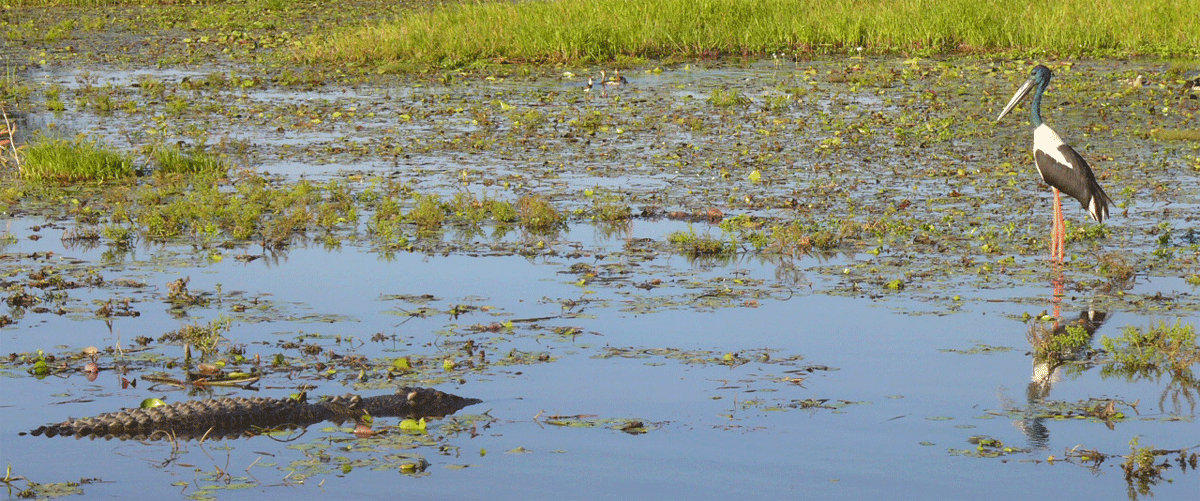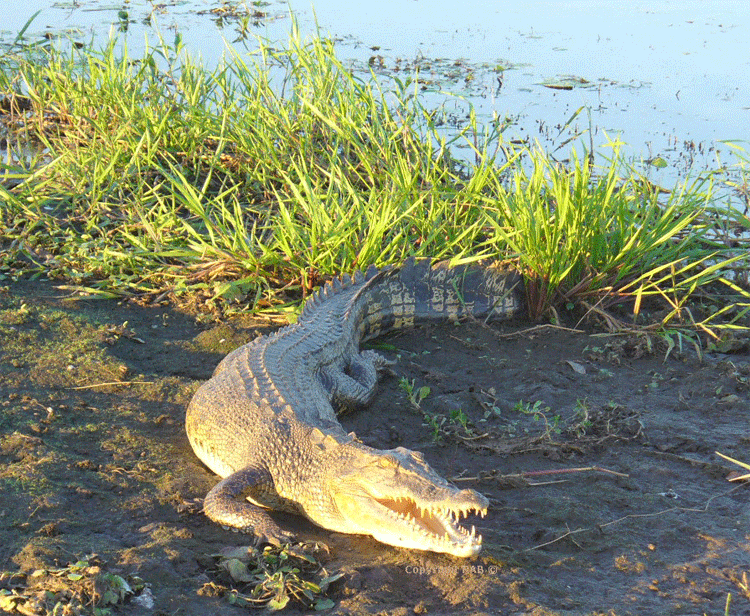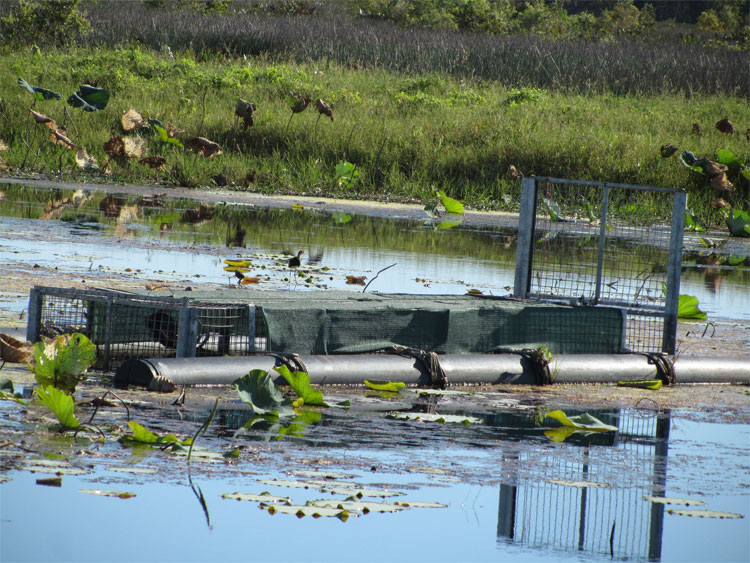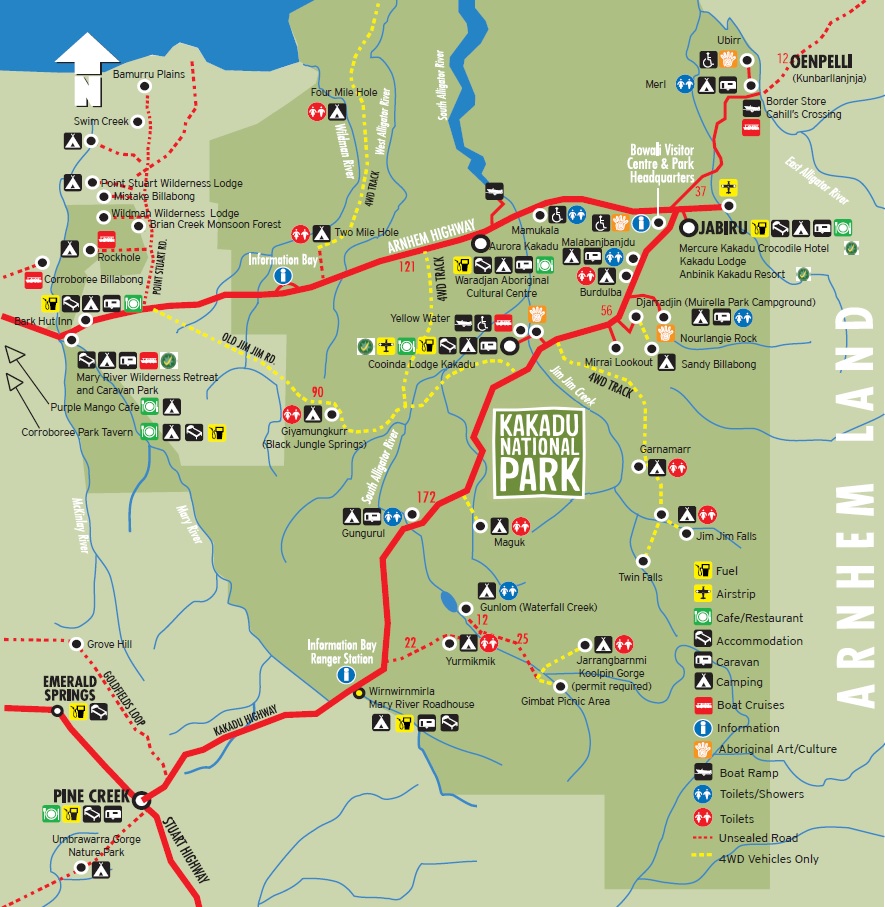Discover the Top End of Australia - Scenic
routes and major tourist destinations from Darwin to Kakadu and
beyond in Northern Territory, Australia
Top End of Australia - A top 5 Australian tourist destination
| A must see when holiday in Australia
| Kakadu
National Park | Litchfield
National Park | Nitmiluk
National Park | Arnhem
Land | Litchfield
and Kakadu Tours | Tailor
Made personalised tours |
![]()
Be Crocwise | Darwin, Top End and Kakadu safety tips on crocodiles
Staying safe in Kakadu
We want you to have a fantastic holiday that’s memorable for all
the right reasons. Kakadu is a wild place – here are our tips
to help you stay safe!
•Take lots of water with you and drink at least four litres a
day.
•Protect yourself from the sun with a broad-brimmed hat, long
loose clothing and a high factor sunscreen.
•Wear sturdy shoes.
•During your visit, please always follow directions from park
rangers - their directions are for your safety.
•Stay on marked tracks and in designated visitor areas - you don’t
want to meet the local crocodiles up close!
•Bringing a boat? Saltwater crocodiles can attack people in boats
- the smaller the boat the greater the risk.
•Be aware of your own limitations and supervise children.
•You won’t have mobile phone coverage in most of the park. Tell
a responsible person where you are heading for the day and when
you plan to return.
•Some roads in and out of the national park are 4WD only and many
sections are steep and narrow and become slippery when wet. Drive
carefully and slowly.
•Obey all safety directions, notices and warning signs.
Beat the heat
•Temperatures regularly reach 30 degrees Celsius or more at Kakadu.
•Walk only in the cooler parts of the day.
•In summer we strongly recommend you walk only in the early morning
before 11.00 am.
•The hottest part of the day at Kakadu is between 2.30 pm and
6.30 pm.
Drive safely
Crossing flooded creeks and rivers can be extremely hazardous
so obey directions from rangers and heed road closures at all
times. Many visitors to Kakadu may not be familiar with driving
on dirt roads. Stay safe on our dirt roads, please drive to your
ability and obey speed limits. Remember
: •Plan ahead and obtain a detailed map before you set off
. •Drive slowly and cautiously – 80 km/h is too fast in most conditions.
•Avoid soft shoulders in the road.
•Allow plenty of space behind the vehicle in front.
•Slow down for on-coming traffic.
•Keep headlights on during the day to increase visibility.
•Lower tyre pressure when driving on rougher roads (check your
car rental conditions).
•Watch out for wildlife, pedestrians and other road users.
Be Crocwise:
•Crocodile Safety for Kakadu Read and remember this advice about
crocodiles before swimming, camping, fishing or boating in Kakadu.
•Saltwater crocodiles are dangerous.
•They have attacked and killed people.
•They inhabit most areas of water in Kakadu National Park including
floodplains, freshwater billabongs, creeks, rivers and coastal
areas.
•Always obey warning signs. If there are no warning signs, it
is always best to assume crocodiles are present.
•To stay safe around waterways you should be vigilant and cautious
and never take unnecessary risks in crocodile habitat.
•Crocodiles are ambush predators and can cause serious injury
or death.
•You are responsible for you own safety so please follow these
guidelines and be Crocwise in crocodile country.
Be Crocwise: Camping
•Ensure you observe all safety signs, and be aware that whenever
you are near water in the park, there is a risk of crocs!
•Bring your own water. It is not safe to collect from any waterways.
•Avoid the water’s edge. Children and pets are at particular risk.
•Be aware that crocodiles can stay hidden underwater for long
period and can move with great stealth and camouflage so you won’t
always see them.
•Camp at least two metres above the high water mark and at least
50 metres from the water’s edge.
•Don’t paddle, clean fish, prepare food or wash at the water’s
edge or next to sloping banks. Do you chores at least 50 metres
away.
•Never dispose of food scraps or fish offal in the water, around
campsites or boat ramps.
•Don’t feed, harass or try to interact with crocodiles. It is
extremely dangerous and against the law. (double check this for
NT - unlawful in WA)
•Don’t interfere with crocodile traps. They are set where there
is an identified nuisance crocodile.
•Be extra vigilant during the breeding season (November to April)
when crocodiles defend a territory or nesting mound and become
more aggressive.
•Always report aggressive crocodiles.
Be Crocwise: Swimming
•Kakadu has Crocodile Management Zones that we monitor regularly
during the visitor season for the presence of crocodiles in order
to minimise risk to humans.
•In the designated Crocodile Management Zone you enter the water
at your own risk.
•Crocodile warning signs are not found everywhere.
•Even in the Crocodile Management Zones, you should always be
cautious around the water. Crocodiles can move back into these
areas at any time.
•Crocodiles are not found up in the escarpments high above waterfalls.
Be Crocwise: Fishing and boating
•Ensure you observe all safety signs, and be aware that whenever
you are near water in the park, there is a risk of crocs!
•Do not enter the water when fishing.
•Never lean over the edge of a boat, out on a tree limb or enter
the water to retrieve snagged lures.
•When fishing from the bank fish five metres from the water’s
edge.
•Saltwater crocodiles can attack people in boats, the smaller
the boat the greater the risk.
•All non-powered vessels are prohibited in Kakadu
•This area is not recommended for rooftop tinnies.(eg alligator
billabong)
![]()
Be Crocwise: Estuarine (Saltwater) Crocodile
Myth Busting
Saltwater crocodiles only live in salt water.
• FALSE - they can be found more than 200km up river from the
coast in freshwater habitats.
Saltwater crocodiles don’t like fast flowing water.
• FALSE - crocodiles are often seen in fast flowing water and
are able to move through rapids and even surf.
Saltwater crocodiles don’t like beaches and you’re
safe to swim there.
• FALSE - crocodiles are often seen on beaches.
Crocodiles do not travel up waterfalls.
• FALSE - crocodiles can go around a vertical obstacle like a
waterfall to reach a pool upstream. The main reason is that young
male crocodiles are trying to establish their own territory.
Crocodiles don’t move around on land much.
• FALSE - they have been know to travel up to one kilometre on
land.
Crocodiles will not stay long in small water holes.
• FALSE - they can remain for extended periods in mud holes if
necessary.
A saltwater crocodile has never been seen here so
they obviously don’t live here.
• FALSE - crocodile number are increasing and they’re repopulating
areas they would’ve occupied before nearly being wiped out in
the late ’60s and early ’70s.
Crocodiles are less active in the dry season so
you’re unlikely to be attacked.
• FALSE - crocodiles are opportunistic hunters and will take advantage
of an easy feed if available.
Crocodiles can’t open their mouth underwater therefore
can’t attack underwater.
• FALSE - although crocodiles need to have their head above water
or be on land to swallow food without taking in water, they can
open their mouths underwater to attack their prey.
Crocodiles are sluggish creatures.
• FALSE - when charging from the water crocdiles have been measured
moving at 12 metres per second.
You can outwit a crocodile by running from them
in a zigzag pattern.
• FALSE - run as fast as you can in a straight line as crocodiles
can only manage short bursts of speed when coming out of the water.
Crocodiles can swim up to 60km/h.
• FALSE - crocodiles can swim 10-15km/h on average.
You are safe to camp beside a river if you have
a fire.
• FALSE -there is no evidence to support this. Always camp 50
metres away from water and at least two metres above the high
water mark.
If you can see the bottom, it’s safe to swim.
• FALSE - all bodies of water in Kakadu may have crocodiles present.
You’re safe in the water when launching a boat because
boat noise frightens crocodiles.
• FALSE - crocodiles are very sensitive to sound and vibration,
and in most cases this attracts them.
It’s OK to swim if you don’t stay in too long.
• FALSE - it takes less than a second to be attacked by a crocodile.
If you keep a lookout, you will be able to tell
if a crocodile is near.
• FALSE - a crocodile can hold its breath and stay hidden underwater
for long periods and are dangerous ambush predators.
![]()
![]()
• Send
Email on mailto:kakadunationalpark@environment.gov.au
![]()
![]()
![]()
-
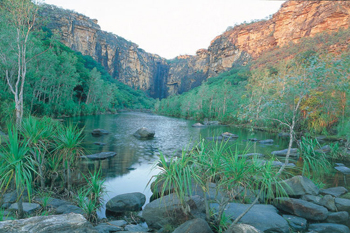
4wd camping tours to Jim Jim Falls Kakadu Australia
Hike and trek the 1 klm path to one of Kakadu's greatest waterfalls in Jim Jim Gorge in Kakadu National Park
-
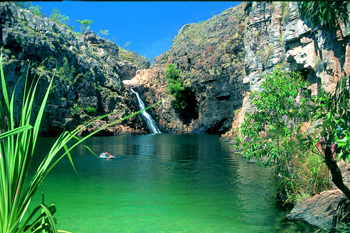
4wd camping tours to Maguk - Barramundi Gorge
Short hike from the 4wd car park to tour Kakadu's pristine all year round creek feed Maguk pool for a swim
-
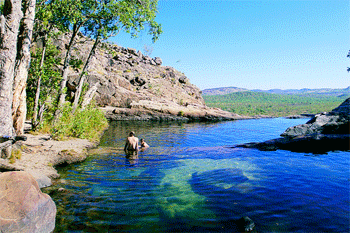
Kakadu 4wd tours to Gunlom Falls and Rock Pool
Gunlom Waterfall tours and Rockpool 4wd access track - explore remote areas of Kakadu and the Top End
-
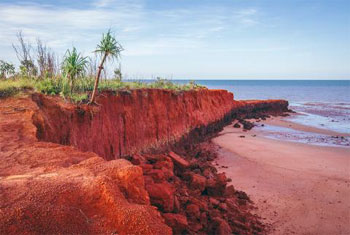
4wd camping tours to Arnhem Land from Darwin
Include majestic Arnhem Land in your next planning for a Kakadu 4wd camping tour in Top End of Australia
-
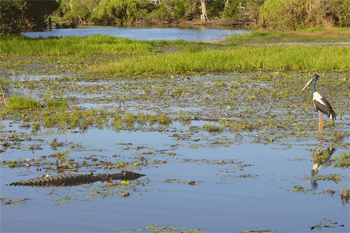
Yellow Waters cruise on Yellow Waters Billabong
Scenic wildlife cruises on a outback billabong. Kakadu 280 different types of birds and 10,000 crocodiles
-
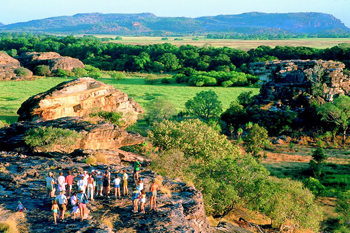
Nourlangie versusUbirr rock art Kakadu
Explore the ancient rock painting art galleries in Kakadu Australia. See first European tall ship drawings
-
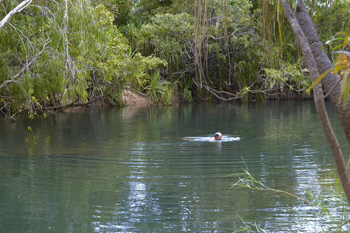
Personalised custom made Kakadu tours
Let us help plan your Kakadu custom made tour include Katherine Gorge and Litchfield National Park
-
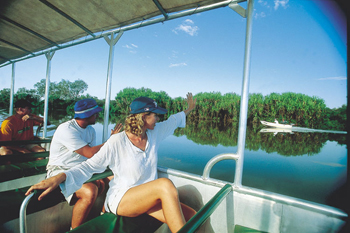
Kakadu 4wd tour with 'The Territory Specialists'
Over 200 Territory tour specials Australia 4 Tours & Uluru Camping Tours with Darwin based experts
-
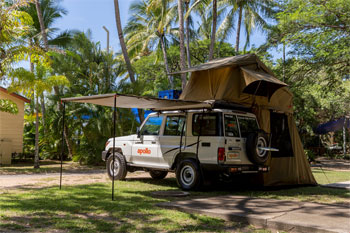
Travel self drive Australia's Kakadu & Top End
Condiser doing it yourself then a 4WD Camper Rentals from Darwin. Travel in a loop return or oneway
